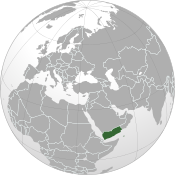Suicide bombers attack mosques in Sanaa, Yemen
Saturday, March 21, 2015
Two mosques in Sanaa, Yemen's capital, were attacked by suicide bombers yesterday, killing over 100 and injuring over 250 more.
The attacks targeted mosques used by supporters of the Houthi rebel movement, who reportedly support former president Ali Abdullah Saleh and now control Sanaa. The elected president, Abd-Rabbu Mansour Hadi, has moved to Aden, to the south.
Muslim militant group Islamic State have claimed responsibility for the attack, according to Twitter accounts known to be connected to the group. Islamic State are known to have set up a base in Yemen last November, but are not known to have previously carried out an attack there. A White House spokesman, Josh Earnest, stated that the group's claim of responsibility cannot be confirmed, and raised the possibility the claim could be propaganda.
al-Qaeda in the Arabian Peninsula, centered in Yemen, denied responsibility, highlighting their leader has declared mosques and markets off-limits for attack. Yemeni Political adviser Mohamed Qubaty attributed the attacks to supporters of Saleh. Qubaty called the attacks "a plot to widen the schism between the Sunnis and Zaydis". Zaydi refers to the branch of Islam followed by the Houthis.
UN Secretary General Ban Ki-moon condemned the attacks and called for hostilities to cease, urging restraint.
Sources
- "Scores killed in suicide attacks on Yemen mosques" — Al Jazeera, March 21, 2015
- "Yemen crisis: More than 100 die in attacks on Sanaa mosques" — BBC News Online, March 20, 2015
- Julia Edwards, Susan Heavey and Lisa Lambert. "White House: cannot confirm link between Yemen attack, Islamic State" — Reuters, March 20, 2015



